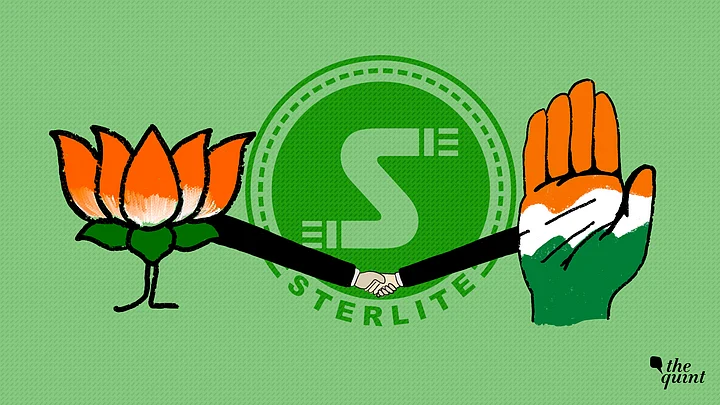(On 2 July 2018, the Supreme Court of India issued notice to the Centre on a petition challenging the retrospective amendments made to the Foreign Contribution Regulation Act via the Finance Acts of 2016 and 2018. The Central Government now has to respond to the arguments by the Association for Democratic Reforms and EAS Sarma that the amendments, which validate contributions received by political parties from foreign companies like Vedanta, are illegal and unconstitutional. In light of this news, The Quint is republishing this article from its archives.)
At least 11 people have died in police firing after protesters rallied against the expansion plans of Sterlite Copper in Thoothukudi (Tuticorin). Sterlite Copper is a subsidiary of the UK-based Vedanta Group. The disproportionate use of force by the Tamil Nadu police, including ‘sniper-style shooting’ using semi-automatic rifles, has been met with nationwide criticism.
In an unusually strong response, Rahul Gandhi called the deaths “a brutal example of state-sponsored terrorism”, targeting the AIADMK government, which the Congress sees as a proxy for the Narendra Modi administration.
What’s being glossed over in this political rhetoric, however, is the fact that both the Congress and the BJP have benefited monetarily from Vedanta’s Sterlite Copper and that both parties appear to have worked in tandem to shield themselves from punitive action under what was once a stringent Foreign Contributions Regulation Act (FCRA).
Here’s how.
In January 2013, former Secretary to the Government of India, EAS Sarma, and the Association for Democratic Reforms (ADR), filed a Public Interest Litigation (PIL) in the Delhi High Court claiming that the Indian National Congress (INC) and the Bharatiya Janata Party (BJP) had accepted donations from the UK-based Vedanta Group in violation of the Representation of People’s Act 1951 and the FCR Act of 1976 and 2010.
This made the Vedanta Group the single largest donor to both the Congress and the BJP during that period.
The petitioners pointed out that the rationale of the FCR Act was to prevent any interference from foreign elements in our internal electoral processes.
In March 2014, after ten hearings, the Delhi High Court pronounced its verdict – the court held the INC and the BJP guilty of violating the FCRA and directed the government of India (UPA at the time) and the Election Commission to take action against the two political parties within a period of six months.
In June 2014, the Congress that had just been booted out filed a special leave petition (SLP) against the Delhi High Court decision. Two months later, the BJP also filed an SLP in the Supreme Court against the Delhi High Court verdict.
With the proceedings on in the Supreme Court, the six-month deadline set by the Delhi High Court lapsed in September without any action being initiated against either party.
Curiously, in several no-holds-barred election campaigns that followed since 2014, neither the BJP nor the Congress brought up the issue of them accepting political donations from Vedanta that were in violation of FCRA.
The First ‘Helpful’ Amendment
In February 2016, when the Modi government presented its first Budget in the Lok Sabha, the contentious Finance Bill was passed that amended the FCR Act of 2010 with retrospective effect.
Essentially, the amendment changed the very definition of ‘foreign contributions’ to include money donated by Indian subsidiaries of foreign companies, so that there would no longer be a violation.
But there was a problem.
Donations by Vedanta’s subsidiaries to INC and BJP were made between 2004 to 2009. The Amendment was made to the FCR Act 2010, and applied retrospectively only until 2010.
But the parties were held guilty under the FCR Act 1976, a fact that was highlighted during the Supreme Court hearing that took place on 22 November 2016. It was argued that since the Delhi High Court held the INC and the BJP guilty under the 1976 FCR Act, the retrospective amendment to the 2010 FCR Act would have no bearing on its verdict.
On 29 November 2016, the Congress and the BJP sought permission to withdraw their appeals and the Supreme Court records show the matter “Dismissed as withdrawn”.
In March 2017, the original petitioners – EAS Sarma and ADR – filed a contempt petition in the Delhi High Court against the Union of India for not implementing the Court’s 28 March 2018 order which was to be implemented within six months.
The Second Convenient Amendment
While the hearings continued through the year with lawyers seeking adjournments, in February 2018, the Modi government once again affected a controversial amendment to the Finance Bill. Among other things, it changed the date from whereon the FCRA violations could be scrutinised, with retrospective effect, of course. So, 26 September 2010 was rewound to 5 August 1976.
So any legal proceedings against the Congress or the BJP for violating Indian law, are now redundant.
(At The Quint, we question everything. Play an active role in shaping our journalism by becoming a member today.)
